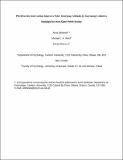Pro-diversity intervention improves Poles’ intergoup attitudes by increasing collective nostalgia for more open Polish society
Abstract
The content of group-based emotions like collective nostalgia (i.e., a sentimental longing for how one’s social group used to be) matters. Yet this has been distressingly overlooked despite the predictive utility that the content of a specific group-based emotion may yield. For instance, there is growing evidence that collective nostalgia for a society that is more homogenous heightens prejudice, while collective nostalgia for a society that is more open and tolerant society increases acceptance of outgroups. In an intervention-based longitudinal study with Polish adolescents (N = 476), we tested whether the content of collective nostalgia can be influenced by highlighting particular aspects of Polish history. The intervention highlighted a history of co-existence between ingroup and outgroup members. We predicted and found that the intervention increased openness-focused nostalgia, which in turn improved intergroup attitudes. Results suggest that community-based interventions can improve intergroup attitudes by eliciting nostalgia for a more open past.
Citation
Stefaniak , A , Wohl , M J A & Bilewicz , M 2021 , ' Pro-diversity intervention improves Poles’ intergoup attitudes by increasing collective nostalgia for more open Polish society ' , Affective Science , vol. 2 , no. 4 , pp. 397-401 . https://doi.org/10.1007/s42761-021-00031-3
Publication
Affective Science
Status
Peer reviewed
ISSN
2662-205XType
Journal article
Description
Funding: This research was supported by the Social Sciences and Humanities Research Council of Canada Insight Grant (#435-2019-0692) to Wohl and NCN Sonata bis grant (2017/26/E/HS6/00129).Collections
Items in the St Andrews Research Repository are protected by copyright, with all rights reserved, unless otherwise indicated.

